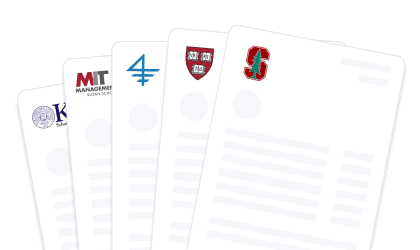The 10 Best MBA Programs for Product Management
Explore the top 10 MBA programs for product management—learn which schools offer the best PM training, industry access, and career outcomes.
Posted February 5, 2026

Join a free event
Learn from top coaches and industry experts in live, interactive sessions you can join for free.
Table of Contents
Product management is an industry focused on creating products and brands, and making sure that they succeed in the market. While the process varies depending on the kind of product, generally it starts with ideation, in which companies gather ideas for a product and evaluate its quality in comparison to the competition. PMs also look at the demand for the product, the customer targets, and its revenue potential.
In this article, we’ll explore some of the best MBA programs for product management, highlighting key programs, sample courses, and average salaries to help you find the right path to a successful career in product management. Whether you're just starting or looking to pivot into a more strategic role, these MBA programs can provide the knowledge, network, and skills needed to thrive as a product manager.
What is Product Management?
Product management is an exciting field that involves creating and launching successful products and services. It requires a unique blend of business operations knowledge, technical understanding, and creative vision. Product managers are responsible for overseeing the entire life cycle of a product, from beginning to end, and ensuring its success and longevity.
PMs must excel in team-building, leadership, and influence without direct authority. Product management involves building high-performing teams, coordinating with diverse stakeholders, and making strategic decisions to drive business growth.
Read: What is Product Management?
Why an MBA in Product Management?
An MBA in product management is a valuable investment for career growth and opportunities. It expands one’s skill set, knowledge base, and career prospects, creating lucrative opportunities in the competitive job market.
An MBA in product management equips individuals with the necessary skills to navigate the modern business landscape, including strategic decision-making, brand management, and innovation. With an MBA in product management, individuals can gain a competitive advantage in the job market and pursue leadership roles in product development.
Should Product Managers Get an MBA?
Whether or not an MBA is right for you depends on your trajectory and goals. An MBA can offer a lot of benefits, such as enhancing your business acumen in areas like finance, marketing, and strategy, which are critical for PMs looking to move into leadership roles. Additionally, the networking opportunities can open doors to career advancement or help facilitate a transition into product management from another field.
An MBA, however, can also be a significant time and financial investment, and it’s important to weigh that against your trajectory. Unlike other fields, PMs can easily find success in their careers without a graduate degree, relying instead on industry experience and technical skills.
Read: When to Get an MBA, When Not To – and How it Affects Your Chances of Getting In
Product Management MBA Experts
The best way to figure out if an MBA is right for your career in product management, and how to navigate the application process and get in, is to work with an expert who's been there and can provide personalized guidance based on your goals and background. Here are several popular MBA coaches with a background in product management that you can work one-on-one with toward your goals.
- Bria H.: MIT Sloan MBA, Columbia MPA/MA, Amazon Product Manager, Ex-PM at Nike
- Kassidy S.: Stanford GSB MBA & Wharton Admit, Former Technical Product Manager at Capital One
- Christina P.: Michigan Ross MBA, Former Lead Product Manager at Deel, Ex-Amazon, Founder

MBA Application Checklist
Stay on track with your MBA apps. Get a full customizable checklist of what to do, when, and how to do it well.
Top MBA Programs for Product Managers
1. Sloan School of Management — Massachusetts Institute of Technology
- Percentage of Graduates in Product Management/Development: 13.2%
- Average Base Salary: $168,095
- 32.1% of Sloan MBA grads entered consulting roles, making it the most common post-MBA industry
As one of the most prestigious MBA programs for technology-minded individuals, Sloan has several opportunities in product management. They offer three tracks, one of which is the Enterprise Management Track, where students learn a holistic approach to solving modern business problems. As outlined on Sloan’s website, this is the best track for those hoping to enter a career in PM.
In addition to this track, Sloan offers a Digital Product Management Certificate. MBA candidates interested in PM can get this certificate by taking the required number of PM core and elective credits and participating in a real-life, hands-on product management project. 17% of the students who complete this certification go on to take jobs in PM, making it the second-largest job category for Sloan MBA graduates.
This highlights the diverse product management careers available to graduates, ranging from product marketing in consumer goods to technical product management in technology firms.
Lastly, Sloan also has a Product Management Club, one of the largest clubs in the business school with over 700 active members. This club sponsors events, connects students with peers and alumni, and hosts guest speakers.
Example PM Courses at MIT Sloan:
- Digital Product Management and Digital Product Management Lab
- Entrepreneurial Strategy
- Product Design and Development
- Platform Strategy and Entrepreneurship
- The Analytics Edge
Learn more about the MBA program at MIT.

2. Graduate School of Business — Stanford University
- GSB Graduates in Product Management: 9%
- Average Base Salary: $189,010
- 14% of Stanford MBA grads went into consulting, reflecting the program’s strong tech and entrepreneurship focus
Like Sloan, GSB is known for being a world leader in technology due to its proximity to Silicon Valley, the high quality of professors, and its history of excellence. The curriculum is intended to be well-rounded and optimized for flexibility. The first year of the MBA degree program provides a foundation in general management knowledge while the second year can be spent specializing skills through electives, seminars, a joint degree, and courses in other Stanford schools. There are no MBA “tracks,” but the wide variety of electives offered allows students to choose their own paths.
Example PM Courses at Stanford GSB:
- Strategies of Effective Product Management
- Strategic Management of Technology and Innovation
- Product/Market Fit
- Assessing High-Impact Business Models in Emerging Markets
- Strategic Thinking in Action — In Business and Beyond
Learn more about the MBA program at Stanford GSB.
3. Haas School of Business — University of California, Berkeley
- Sloan Graduates in Product Management: 6%
- Average Base Salary: $162,831
- 25.4% of Haas grads joined consulting firms, closely followed by tech at 24.3%
Haas is one of the MBA programs that funnels the most students into careers in technology upon graduation. It offers a concentration in Technology for candidates who want a broader range of skills in data analysis, product management, business development, and strategy. Haas is also known for its curriculum’s heavy emphasis on experiential learning.
For this reason, future product managers will be able to take advantage of learning about PM inside and outside the classroom.
Example PM Courses at Berkeley Haas:
- Product Management
- Team Facilitation for Product Managers
- The Lean Launch Pad
- Built for Growth
- Strategy
Learn more about the MBA program at Berkeley Haas.
4. Stern School of Business — New York University
- Stern Graduates in Product Marketing: 4.7%
- Average Base Salary for PM: $175,000
- 28.8% of Stern grads entered consulting, reflecting strong East Coast recruiting and industry ties
The best MBA program for entering a career in product management is the Tech MBA offered by NYU Stern. Candidates will learn the fundamentals of business and expand their knowledge of technology through four areas of the curriculum: the business core, the technology core, Stern Solutions, and elective courses. In addition to the tech MBA, the school also has a Tech Product Management specialization available, which uniquely prepares students for careers in product management. This specialization can be seen as a product management MBA, enhancing relevant skills and facilitating career advancement in various markets and industries.
Example PM Courses at NYU Stern:
- Digital Disruption: Creating and Capturing Value
- Emerging Technologies
- High Tech Entrepreneurship
- Predicting the Future of Technology
- Design Thinking for Managers
Learn more about the MBA program at NYU Stern.

5. Kellogg School of Management — Northwestern University
- Kellogg Graduates in Tech (Includes PM): 25%
- Average Base Salary: $207,000
- 35% of Kellogg MBA grads went into consulting — the highest among top-tier programs.
The Kellogg School of Management is renowned for its top-tier MBA program, particularly for students aspiring to build successful careers in product management. With an average base salary of $207,000, graduates from Kellogg's MBA in Product Management program are well-prepared for leadership roles in technology companies and various industries. Kellogg’s Technology Management Pathway offers a specialized track that equips students with the necessary skills to excel in product management, product marketing management, and technology strategy roles. This MBA program offers a comprehensive product management curriculum, divided into three main sections: foundational courses, competitive advantage, and exploratory courses.
Example PM Courses at Kellogg:
- Product Management for Technology Companies: An Entrepreneurial Perspective
- Technology Marketing
- Launching New Products and Services
- Customer Analytics and AI
- Introduction to Software Development (foundational course for PM at Apple, Amazon, Meta, Google, Microsoft, etc..)
Bonus: Tepper School of Business — Carnegie Mellon University
- Tepper Graduates in Tech (Including PM): 24%
- Average Base Salary: $156,291
- Tepper has historically placed 25–30% of grads into consulting
Tepper is a program well-known for bringing students into product management. It offers a product management MBA track in Technology Strategy and Product Management for its MBA candidates, which is designed to build a deep understanding of strategic and management skills alongside the development and management of technologies. Graduates of this track are uniquely positioned to solve the issues that lie at the intersection of business and technology.
For individuals who are interested in a career in PM, CMU also has a Master of Science in Product Management. This program is only one year long and is offered by both the Tepper School of Business and the top-ranked CMU School of Computer Science. Many of the students come from technical backgrounds, but others have come from marketing, finance, and other business-related areas.
Example PM Courses at CMU Tepper:
- Finance for Product Managers
- Data Science for PMs: Making Products Count
- New Product Management
- Product Design Thinking and Practice
- Managing Intellectual Capital and Knowledge-Intensive Industries
6. Wharton School — University of Pennsylvania
- Wharton Graduates in Product Management/Tech: ~15%
- Average Base Salary for PM/Tech: $175,000
- 25.2% of Wharton MBA grads entered consulting in 2024, making it a top post-MBA destination
Wharton offers a rigorous, customizable MBA experience that bridges business strategy, analytics, and cross-functional leadership. While it’s known for finance, its strength in operations, tech, and entrepreneurship makes it an excellent fit for future PMs. Students can pursue electives across product development, customer analytics, and innovation, or tailor their path through Wharton’s Entrepreneurship & Innovation major. With top-tier recruiting across tech and consulting, Wharton provides strong strategic optionality for product-minded candidates.
Example PM Courses at Wharton:
- Digital Product Management
- Managing the Productive Core of the Firm
- Customer Analytics
- Enabling Technologies
- Innovation and the Product Development Process
Learn more about the MBA program at Wharton
7. Booth School of Business — University of Chicago
- Booth Graduates in Tech (Including PM): 16.9%
- Average Base Salary for PM/Tech: $175,000
- Around 34% of Booth MBA grads entered consulting, placing it among the top industries
Booth’s flexible curriculum and analytical rigor make it ideal for students targeting product roles with a data or strategy focus. PM-minded students can take tech-forward courses in pricing strategy, behavioral economics, machine learning, and software product management. Booth also offers multiple labs, including the LEAD program and the New Venture Challenge, where students work on real-world innovation projects. Its career services and alumni network are strong across both coasts, with growing traction in product-focused roles at Amazon, Google, and startups.
Example PM Courses at Booth:
- Platform Competition
- Algorithmic Marketing
- New Product Innovation
- Technology Strategy
- Managing in Organizations (LEAD)
Learn more about the MBA program at Chicago Booth.
8. Harvard Business School
- HBS Graduates in Product Management/Tech: ~18%
- Average Base Salary for PM/Tech: ~$175,000
- Approximately 18% of HBS grads entered consulting, notably lower than many peer institutions
HBS’s general management curriculum emphasizes leadership, communication, and decision-making skills at the core of effective product management. While it doesn't have a formal PM track, students can tailor electives to tech strategy, customer insight, and innovation. The case method fosters PM-adjacent skills like navigating ambiguity, leading cross-functional teams, and prioritizing tradeoffs. HBS grads frequently land roles in big tech, healthtech, and startups, or pivot into product via generalist programs at companies like Amazon, Google, and Meta.
Example PM Courses at HBS:
- Product Management 101
- Digital Innovation and Transformation
- Launching Tech Ventures
- Competing with Platforms
- Managing Growth
- Learn more about the MBA program at Harvard Business School.
9. INSEAD
- INSEAD Graduates in Tech/Internet Services: ~19%
- Average Base Salary: €111,400 (~$118,000 USD)
- Roughly 30–35% of INSEAD MBA graduates enter consulting, making it one of the program’s core industries
With campuses in France, Singapore, and Abu Dhabi, INSEAD is a global powerhouse — especially for candidates seeking international PM roles. The one-year format is intense and fast-paced, but offers targeted electives in strategy, innovation, and technology. INSEAD grads go on to PM and strategy roles at firms like Google, Microsoft, Uber, and McKinsey Digital. The school also has deep ties to European tech and global CPG firms, making it a strong launchpad for cross-border product careers.
Example PM Courses at INSEAD:
- Technology and Innovation Strategy
- Digital @ Scale
- Product and Business Model Innovation
- Entrepreneurial Leadership
- Driving Value Through Business Integration
Learn how to get into an MBA program at INSEAD.
10. Columbia Business School — Columbia University
- Columbia Graduates in Product / Brand & Marketing: ~ 11.1% (Brand / Product Management function)
- Average Base Salary for PM / Brand Roles: ~$175,000 (median base for overall class)
- 30.6% of Columbia MBA grads entered consulting in 2024, making consulting the largest industry segment
Columbia Business School’s MBA blends rigorous core training with deep access to New York’s finance, tech, and media ecosystems. Students can shape their MBA path with electives in product strategy, digital marketing, and innovation. Because consulting is a dominant recruiting stream, many students retain strong flexibility across strategy and product roles. The brand, alumni network, and location give CBS grads a powerful edge for product leadership roles in both consumer and tech firms.
Example PM / Brand Courses at Columbia:
- Brand / Product Management
- Digital Strategy & Innovation
- Platform Strategy
- Product Marketing
- Leading Innovation in Organizations
Learn more about the MBA program at Columbia Business School.
How to Leverage Your MBA to Become a High-Impact Product Manager
Whether you're a software engineer pivoting into PM, a marketer aiming for a product marketing manager role, or an early-career PM eyeing the C-suite, your MBA is a powerful lever — if you use it strategically. Here’s how to get the most out of your MBA experience and position yourself for a top-tier product management role after graduation.
1. Start With a Strategic Skills Gap Analysis
Before you step onto campus, conduct a clear-eyed assessment of your current strengths and what you’ll need to succeed in PM, especially if you’re targeting roles at the intersection of business, design, and tech. Are you strong in product execution but light on business strategy? Have you led cross-functional teams, or are you new to influencing without authority?
A good MBA program should help you close these gaps with hands-on experience, academic rigor, and access to industry leaders who’ve done the job you’re aiming for.
Pro tip: If you're targeting high-level roles like chief technology officer or director of product, prioritize programs that emphasize leadership, innovation, and systems thinking, not just technical PM skills.
2. Choose Electives That Build Practical, Transferable Skills
Few programs offer an official "Product Management MBA," but the best ones let you build a tailored path through electives and experiential learning. Focus on courses that help you develop:
- Strategic decision-making and go-to-market frameworks (e.g. Business Strategy, Product Marketing Management)
- Technical fluency (e.g. Learning Management Systems, Data Science for PMs, Agile Development)
- Human-centered design and customer insight (e.g. Design Thinking, Product Design)
- Leadership across functions (e.g. Leading Cross-Functional Teams, Influence Without Authority)
Many schools also offer PM-adjacent pathways, like Kellogg’s Technology Management Pathway or MIT Sloan’s Digital Product Management Certificate, that combine practical skills with exposure to sustainable business models and innovation strategy.
3. Build a Powerful Professional Network in PM
Your MBA network will be one of your most valuable long-term assets. Use your time in school to actively connect with industry professionals and future hiring managers. Join product clubs, attend tech treks, and build relationships with second-years and alumni who’ve landed at places like Google, Amazon, and Meta.
Also, don’t underestimate the career value of smaller, more focused groups: startup incubators, design sprints, and cross-functional product labs can often connect you with industry leaders and founders in more meaningful ways than large-scale recruiting events.
4. Use Experiential Learning to Test and Prove Your PM Skills
Many of the top programs offer real-world PM opportunities through capstones, internships, or school-sponsored product labs. For example:
- NYU Stern’s Tech MBA offers project-based learning with NYC startups
- Stanford GSB allows cross-enrollment with the engineering school for PM-heavy projects
- HBS’s Product Lab puts students on actual product teams alongside engineers and designers
These experiences will not only build practical skills but also give you concrete stories to tell in interviews, especially if you haven’t officially held the PM title before.
5. Map Your Career Development Plan Early
Product management is not a one-size-fits-all job. Some MBAs go on to become product marketing managers in SaaS, others launch their own ventures, and some join rotational APM programs that fast-track them to leadership roles.
To stand out in the job market and find a role aligned with your strengths, work with your career center, mentors, and PM coaches to build a roadmap that reflects your ideal:
- Industry (e.g. enterprise SaaS, consumer tech, fintech, healthcare)
- Role type (e.g. core PM, platform PM, product ops, PMM)
- Long-term trajectory (e.g. Head of Product, GM, Chief Technology Officer)
The earlier you define these goals, the more you can tailor your MBA experience, from electives to internships to networking, to support them.
Career Outcomes and Recruitment
Graduates of MBA programs in product management can pursue a variety of career options, including product manager, senior project manager, and director of product management. According to Glassdoor, the median base pay for a product manager in the United States is approximately $196,314, with top-tier companies such as UBER, Microsoft, Amazon, Apple, Google, Facebook, Uline, Zillow, SAP, Adobe, and LinkedIn hiring product managers.
An MBA in product management can also lead to career opportunities in tech product management, business management, and brand management, with median salaries ranging from $140,000 to $150,000.
The Bottom Line
An MBA in Product Management can open doors to high-level roles in the competitive and lucrative field of product management. The best MBA programs for aspiring product managers offer a mix of strategic, technical, and leadership skills that are crucial for success in this field. Institutions like MIT Sloan, Stanford, and Northwestern Kellogg are known for their strong product management tracks, where students gain the knowledge and network needed to excel in top companies such as Apple, Amazon, and Google. With an average salary of around $196,314 for product managers, an MBA can significantly boost your career prospects and earning potential.
Get Into Your Dream MBA Program With the Help of an Expert
Navigating the MBA application process or preparing for a product management career can be challenging, but you don’t have to do it alone. Working with an expert coach can massively increase your odds of acceptance at top-tier business schools like Harvard, Stanford, and Wharton. Whether you need help with application strategy, crafting a compelling resume, perfecting your interview skills, or developing a personalized approach, our coaches are here to support you every step of the way. Below are several popular coaches; browse all here. Also, check out product management bootcamps and free events for more strategic insights!
Where Can I Start?
We hope you found this list helpful as you navigate through the MBA admissions process or your product management application. Here are some other resources to get you started:
- Tips from an Expert: How to Prepare for Your Product Management Interview
- An Expert’s Guide to Resumes: Five Tips to Make You Stand Out
- 20+ Free Product Management Resources
- Rejected From an MBA Program? Here's What to Do
- An Expert Coach's Top Tips for Non-Traditional MBA Applicants
- Top 25 Business Schools' Acceptance Rates & Class Profiles
- The 10 Best MBA Admissions Consultants
FAQs for Product Management MBA Programs
What is an MBA in Product Management?
- This is a foundational question for anyone exploring an MBA in product management, providing a clear explanation of the degree and its focus.
What are the best MBA programs for Product Management?
- This question highlights top programs, which are valuable for prospective students looking for the best educational opportunities in product management.
Can I pursue a career in Product Management without a technical background?
- This addresses a common concern for non-technical individuals considering product management and provides reassurance.
What job opportunities are available after completing an MBA in Product Management?
- This question focuses on career outcomes, an essential factor for anyone considering this path.
What is the average salary for MBA graduates in Product Management?
- Salary expectations are crucial for potential students to evaluate the financial benefits of pursuing an MBA in product management.
Browse hundreds of expert coaches
Leland coaches have helped thousands of people achieve their goals. A dedicated mentor can make all the difference.



























